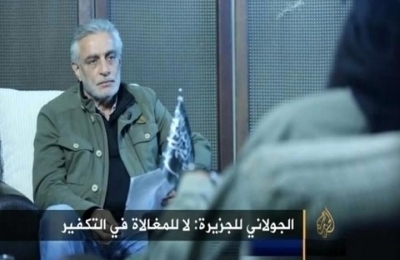The leader of al-Qaeda’s branch in Syria, one of the most powerful groups in the war-torn country, has told Al Jazeera that that the conflict is nearing an end and that his fighters hold the upper hand.
In his first-ever televised interview, Abu Mohammed al-Joulani, the leader of Jabhat al-Nusra, ruled out peace talks with President Bashar al-Assad and warned that Arab states should be cautious of the recent improvement of Iran-US ties.
“The battle is almost over, we have covered about 70 percent of it, and what's left is small. We will achieve victory soon. We pray to God to culminate these efforts with victory. It's only a matter of days,” he said in an exclusive interview with Al Jazeera’s Tayseer Allouni from an undisclosed location in Syria.
Al-Joulani added that al-Nusra – designated by the UN, the US and other western countries as a terrorist organisation – would not accept the outcome of the upcoming international conference in Geneva scheduled for January.
For the interview with Al Jazeera, al-Joulani asked that his face be hidden because of security fears. Little is known about the al-Qaeda leader, but it is believed that he had joined the self-declared jihadist group several years ago to fight US forces in Iraq.
Sunni states 'in jeopardy'
Al-Nusra, which wants to establish a Syrian state that is ruled under Islamic law (Sharia), keeps secret the number of its fighters in Syria, but estimates suggest that it could be anywhere between 5,000 up to 20,000 fighters and have strongholds in different parts of Syria.
Known for using suicide attacks as part of its fight against Assad’s troops, al-Nusra, along with other Syrian rebel groups, has been accused by the UN of committing war crimes against government forces and civilians.
In his interview, al-Joulani warned that Sunni-led Arab states, such as Saudi Arabia, should be cautious of recently improved relations between the US and Iran.
Jabhat al-Nusra have strongholds in different parts of Syria
Last month, a breakthrough agreement was reached between Washington and Tehran, under which Iran would curb its atomic activities in return for some easing of the international sanctions that have battered the country’s economy.
“Those [Sunni-led] regimes are now running out of options as a result of the super powers turning against them. The ferocious tide of the Safavid [Iranian Shia] regime is now coming. All these states are now in jeopardy since the international community replaced them with a new ally, Iran."
The conflict in Syria, which began almost three years ago, has taken increasingly sectarian overtones.
Assad belongs to the Alawite sect, an offshoot of Shia Islam, while most of the rebels trying to overthrow his regime belong to the Sunni majority.
“If the Assad regime remained in power, which is in the interest of the super powers and the Safavids, then the next target will be the Arabian Peninsula, now known as Saudi Arabia.”
The US and Saudi Arabia have been allies since the kingdom was declared in 1932, giving Riyadh a powerful military protector and Washington secure oil supplies. But the recent improvement in relations between Washington and Tehran was one of the low points in US-Saudi ties.
“The majority of oil is located to the east of Saudi Arabia, in al-Ihsaa, Qateef, and Dammam. These areas would be targeted… taken away and given to the new ally, Iran”, al-Joulani warned.
Strict security measures
Al-Nusra suffered a blow in the recent months when hundreds of its foreign fighters defected with their weapons, to join another al-Qaeda linked group, known as the Islamic State of Iraq and the Levant.
But along with other powerful rebel brigades, al-Nusra remains strong and does not recognise the Syrian opposition in exile.
“We will not recognise any results that come out of the Geneva 2 Conference, nor will the children or women of Syria do. Those taking part in the conference do not represent the people who sacrificed and shed blood. Besides, who has authorised them to represent the people?
“Those are confined to newsrooms. In reality, they have no presence on the ground. We cannot allow the Geneva 2 game to fool the nation, to push us back 50 or 100 years,” he said.
Al Jazeera’s Allouni is the first journalist to have met al-Joulani. He said he underwent strict security measures and was heavily searched ahead of the interview.
“The security measures were far stricter than those taken by the security team of Bin Laden,” Allouni said, referring to his interview with the now-deceased Osama bin Laden, the former al-Qaeda global leader, in 2001.
......


